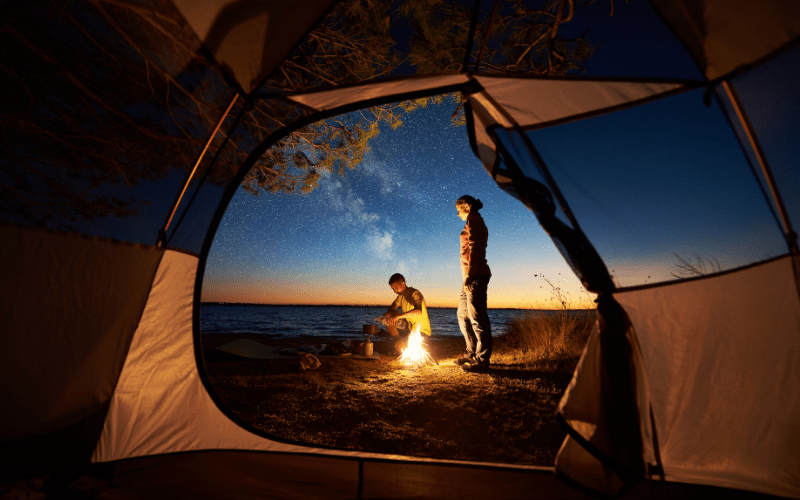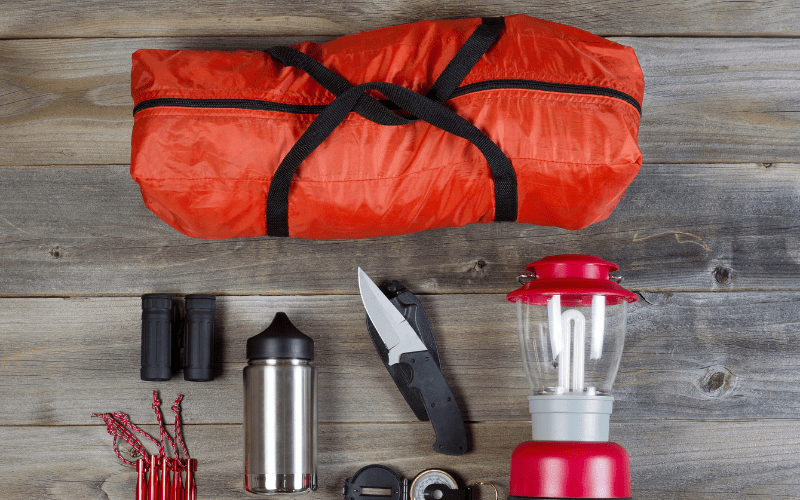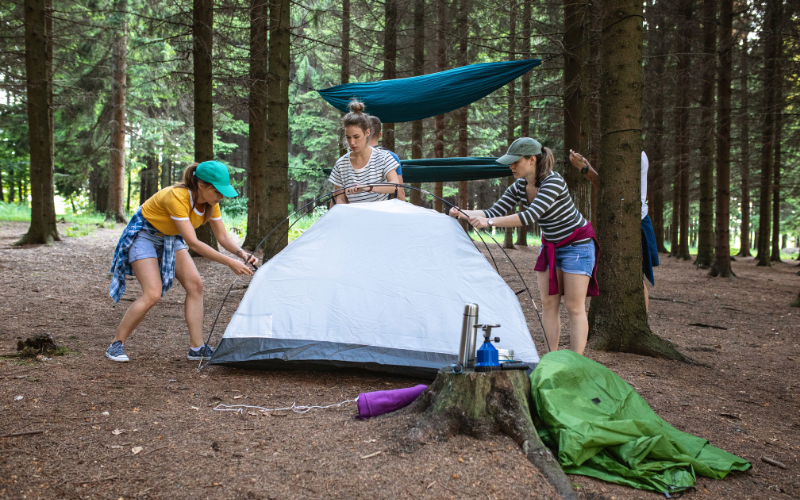

The days are getting warmer, summer is nearly here, and that means camping season is officially open! We all know camping is a fantastic activity for the entire family - packed with hours of enjoyment and a great opportunity to ditch technology and connect with loved ones, and nature.
We’ve compiled the ultimate checklist to get you camper-friendly and ready to be unleashed into the wilderness.
STEP 1: Planning

A successful (and enjoyable) camping trip is 100% dependant on the amount of planning invested beforehand. You don’t want your well-deserved leave days to be ruined because you forgot your braai utensils, or couldn't sleep because you were camping on gravel and forgot your blow-up mattress.
A camping trip can be one of the most enjoyable and cost-effective ways to spend a weekend away - but don’t make the mistake of thinking you’ll “wing it” when you get there. The best campsites become fully booked very quickly, so you’ll want to make sure you book in advance. If you’re planning to take the road less travelled in pursuit of a secluded spot you’ll, at the very least, want to make sure you’re prepared for the terrain and weather conditions.
However, if you’re new to the whole “camping thing” - then we recommend choosing a campsite that offers the most information to newbies. The best way to make a good decision is through word of mouth. Ask around amongst your friends and family if they know of any camping gems in your area. If all else fails, there are plenty of online resources that can supply you with great options.
Ultimately, you’ll want to book your campsite between 2-6 weeks in advance - depending on how popular it is. Next, you should immediately start thinking about what you have and what you’ll need to buy, or borrow. Don’t wait until the night before to realise you haven’t got a sleeping bag!
It’s good to keep in mind that camping can be a very personal experience - you don’t have to conform to anyone else’s idea of how your trip should go. If you don’t like eating baked beans and hot dogs all weekend, then simply put a little more planning into preparing campfire-friendly meals beforehand. This is especially true if you have certain dietary requirements.
STEP 2: Packing
Now that you’ve planned to plan - go ahead and make a thorough list of camping essentials. This will ensure you don’t leave anything vital behind - like the tent!
There is indeed an endless supply of clever gadgets you could cart along on your camping trip (you could truly go crazy in our store!), but as a newbie camp-goer it’s best to focus on the essentials on your first trip. Besides, the more you pack, the more there will be to pack away.
Your camping checklist is also very much dependant on your personal preferences. For example, you may be one of those people who enjoy “roughing it” and living simply for the weekend. In that case, your list will be much shorter - even limited to: tent, sleeping bag, ground mat, food and water.
However, if you’re more of the “glamping” sort of camper, your list will be considerably longer. Indeed, there are many things that could make the trip easier and more comfortable. As a first-timer, we recommend starting with the essentials, and then building on that list based on your individual needs (camping beds, camping carpets etc).

Here’s a list of first-timer camping essentials:
Tent - Make sure the size of the tent works for you. A bigger tent will be more comfortable, and you’ll likely be able to stand up inside the tent making it easier to get changed. A smaller tent will be more space-saving, and will also be easier to pitch. We recommend pitching the tent in your backyard beforehand to make it easier on your camping trip. This is especially useful if you arrive in the dark.
Sleeping Bag - Pack a sleeping bag that will work with the weather. You don’t want an Antarctic sleeping bag if you’re planning to go camping in the desert.
Camping Pillow - Not always essential, but if you have one it can be your best friend for a comfortable snooze.
Ground mat or blow up mattress - Although many seasoned campers sleep on the bare ground, a blow up mattress is just the right amount of luxury you need for a first trip.
Camping chairs - Not essential, but essential for a sociable camping weekend around a campfire and early morning coffees.
Camping table - This will serve as your base for preparing meals and drinks.
Cooler box - Probably the most essential piece of equipment apart from your sleeping bag and tent. Days are hot and when returning from a day trail you won’t want to be welcomed by warm water (or beers!). A large single block of ice melts slower than ice cubes, so fill your cooler with a large piece of ice, and fill whatever space is left with ice cubes.
Cooking Utensils - For the basics, you’ll need a pot, camping plates or bowls, camping knives, forks and spoons. Leave the non-stick stuff behind - on an open fire these can release toxic chemicals.
Food - Make sure to plan campfire-friendly meals in advance, ideally using recipes that have similar ingredients to reduce packing space. For example, boiled potatoes in the evening could translate into potato salad the next day. Also, try and pack a limited amount of spices and condiments. Salt, pepper, oil/butter and tomato sauce should be all you need.
Large water bottles - These will act as your camping base water supply, used for cooking, cleaning and filling water bottles.
Gas burner -There’s nothing better than an early morning camping breakfast. If you think you’ll be too lazy to build a fire every time you need to boil water or cook food - a nifty gas burner will be a handy addition.
Folding shovel - Camping isn’t camping without a campfire, in which case a folding shovel will be perfect for moving coals on the fire while cooking.
Campfire Essentials - Let’s not forget the importance of a good braai on a camping trip. For many, this is the highlight of the day, where friends and family come together to laugh and exchange stories of the day. A steel grate with 10-15cm legs will be ideal for a grid above the coals, or a cast-iron pot. Also, don’t forget the wood and firelighters. No need to worry about the rest - you can use branches as a poker, and rocks to demarcate the braai area.
Coffee - For many, this will be the first thing that goes into the bag. There’s nothing like a good cup of coffee on a fresh, early morning in the wilderness. If you’re really into your java, we recommend bringing along a french press or Italian espresso maker. If not, instant coffee sachets just need hot water.
Games - Not entirely essential, but it’s always a good idea to pack a few games - it’s a great way to bond and have a good laugh with family and friends. At the very least, it will keep the kids occupied.
Black Bags - Most importantly, you should always leave the campsite exactly the way you found it. Remember to bring black bags so that you can discard your waste without littering the area.
STEP 3: Setting up camp

Once you have everything planned, packed and ready for an amazing camping experience, the only thing left to do is choose the ideal spot to pitch your tent. In the summertime, the best camping spots are buzzing with people, so it might be a little more challenging than you think. In this case, it’s best not to be too upset if you can’t park next to the perfect tree. If people bother you that much - rather try and plan a trip during the week, when sites are less busy.
Essentially, there are only a few things to keep in mind setting up camp:
Take note of wind direction: Ideally, you’ll want to set up camp upwind from neighbouring campers, so that their campfire smoke doesn’t blow directly into you. You’ll also want to pitch your tent upwind from your own fire to avoid the smoke.
Take note of sunset and sunrise: Ideally, you’ll want to be out of the sun as much as possible during the day - so try and find a shady spot that still has a good view of the sunset.
Take note of foliage: If you’re planning on camping without a camping mat or blow-up mattress, look for a grassy area - otherwise you’ll likely struggle sleeping comfortably through the night. However, it’s also important to keep in mind that bushy or lush areas also breed spiders, insects and other creatures.
STEP 4: Enjoy the Trip
Now all that’s left to do is enjoy your time outdoors! If you’ve forgotten something, don’t let it spoil your weekend - rather try and improvise or live without it. Embrace the wilderness as an opportunity to experience an adventure outside the city life. After your first experience, you’ll be more than prepared for the next trip, and you’ll know exactly how to tailor your gear to suit your individual needs.

